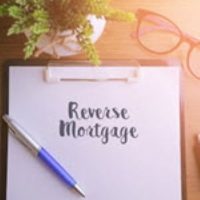Who’s Afraid of Reverse Mortgages?

When you close on the purchase of a house, especially if you are a first-time homebuyer, you have high hopes about paying off the mortgage. You make a budget where you pay more than the minimum payment each month, thereby making a dent in the principal so that you pay less interest over time. You dream of paying it off if you get a big bonus at work, and failing that, refinancing it after you have paid down some of the principal when interest rates are lower than they were when you bought your house. Of course, plans rarely pan out in the ways that you were hoping. Several years later, you are grateful to be able to keep up with the mortgage payments at all, and you are looking for ways that your house, mortgage and all, can help you borrow even more money. Home ownership can enable you to borrow money even when your house is already paid off. Any time you borrow, you are taking a risk, because circumstances might change and keeping up with your payments might be harder than you thought. If you used your house to secure a loan, and now creditors are threatening you with foreclosure, contact a Philadelphia mortgage foreclosure lawyer.
Is a Reverse Mortgage Riskier Than a Home Equity Line of Credit?
The two most common ways in which homeowners borrow money by securing their loans with their houses are home equity lines of credit and reverse mortgages. A home equity line of credit (HELOC) is similar to a credit card, where you can spend up to X amount of money and pay it back in installments, except the interest rate is lower and the credit limit is higher, because whereas credit cards are unsecured, HELOCs have your house as collateral. You can qualify for a HELOC even if you still owe money on your original mortgage. Many of the households that live paycheck to paycheck despite a household income in excess of $100,000 are in this situation because they are responsible for both a HELOC payment and a mortgage payment each month. If you can’t repay your HELOC to the lender’s satisfaction, you can lose your house.
With a reverse mortgage, you borrow as a lump sum and repay as a lump sum. The money is not due until the borrower sells the house or dies. Most borrowers who take out reverse mortgages have already paid off their original mortgages. The biggest risk with a reverse mortgage is that the lender will claim it from your estate during probate. If you also owe other debts, this could mean that your estate must sell the house, so that instead of inheriting the house, your descendants only inherit a portion of its value.
Contact CONSUMERLAWPA.com About Staying Out of Trouble With Home Mortgages
A Philadelphia consumer law attorney can help you if you are struggling to make payments on your home mortgage or home equity line of credit. Contact CONSUMERLAWPA.com to set up a free, confidential consultation.
Source:
marketwatch.com/guides/home-equity/heloc-vs-reverse-mortgage/#:~:text=HELOCs%20are%20like%20a%20credit,the%20equity%20in%20your%20home.


